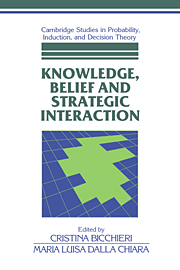Book contents
- Frontmatter
- Contents
- Preface
- List of contributors
- 1 Feasibility
- 2 Elicitation for games
- 3 Equilibrium, common knowledge, and optimal sequential decisions
- 4 Rational choice in the context of ideal games
- 5 Hyperrational games: Concept and resolutions
- 6 Equilibria and the dynamics of rational deliberation
- 7 Tortuous labyrinth: Noncooperative normal-form games between hyperrational players
- 8 On consistency properties of some strongly implementable social choice rules with endogenous agenda formation
- 9 Algorithmic knowledge and game theory
- 10 Possible worlds, counterfactuals, and epistemic operators
- 11 Semantical aspects of quantified modal logic
- 12 Epistemic logic and game theory
- 13 Abstract notions of simultaneous equilibrium and their uses
- 14 Representing facts
- 15 Introduction to metamoral
- 16 The logic of Ulam's games with lies
- 17 The acquisition of common knowledge
- 18 The electronic mail game: Strategic behavior under “almost common knowledge”
- 19 Knowledge-dependent games: Backward induction
- 20 Common knowledge and games with perfect information
- 21 Game solutions and the normal form
- 22 The dynamics of belief systems: Foundations versus coherence theories
- 23 Counterfactuals and a theory of equilibrium in games
22 - The dynamics of belief systems: Foundations versus coherence theories
Published online by Cambridge University Press: 05 November 2011
- Frontmatter
- Contents
- Preface
- List of contributors
- 1 Feasibility
- 2 Elicitation for games
- 3 Equilibrium, common knowledge, and optimal sequential decisions
- 4 Rational choice in the context of ideal games
- 5 Hyperrational games: Concept and resolutions
- 6 Equilibria and the dynamics of rational deliberation
- 7 Tortuous labyrinth: Noncooperative normal-form games between hyperrational players
- 8 On consistency properties of some strongly implementable social choice rules with endogenous agenda formation
- 9 Algorithmic knowledge and game theory
- 10 Possible worlds, counterfactuals, and epistemic operators
- 11 Semantical aspects of quantified modal logic
- 12 Epistemic logic and game theory
- 13 Abstract notions of simultaneous equilibrium and their uses
- 14 Representing facts
- 15 Introduction to metamoral
- 16 The logic of Ulam's games with lies
- 17 The acquisition of common knowledge
- 18 The electronic mail game: Strategic behavior under “almost common knowledge”
- 19 Knowledge-dependent games: Backward induction
- 20 Common knowledge and games with perfect information
- 21 Game solutions and the normal form
- 22 The dynamics of belief systems: Foundations versus coherence theories
- 23 Counterfactuals and a theory of equilibrium in games
Summary
THE PROBLEM OF BELIEF REVISION
In this chapter I want to discuss some philosophical problems one encounters when trying to model the dynamics of epistemic states. Apart from being of interest in themselves, I believe that solutions to these problems will be crucial for any attempt to use computers to handle changes of knowledge systems. Problems concerning knowledge representation and the updating of such representations have become the focus of much recent research in artificial intelligence (AI).
Human beings perpetually change their states of knowledge and belief in response to various cognitive demands. There are several different kinds of belief changes. The most common type occurs when we learn something new, either by perception or by accepting the information provided by other people. This kind of change will be called an expansion of a belief state. Sometimes we also have to revise our beliefs in the light of evidence that contradicts what we had earlier (mistakenly) accepted, a process that will here be called a revision of a belief state. And sometimes – for example, when a measuring instrument is malfunctioning – we discover that the reasons for some of our beliefs are invalid, and so we must give up those beliefs. This kind of change will be called a contraction of an epistemic state. Note that when a state of belief is revised, it is also necessary to give up some of the old beliefs in order to maintain consistency.
- Type
- Chapter
- Information
- Knowledge, Belief, and Strategic Interaction , pp. 377 - 396Publisher: Cambridge University PressPrint publication year: 1992
- 3
- Cited by



